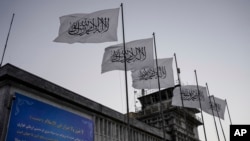The Taliban's quest for normalization of relations with the international community, which includes relief from terrorism sanctions and the release of Afghan financial assets, faces significant obstacles due to the regime's oppressive policies toward women, ongoing security threats, and the group's failure to form an inclusive government, according to a top U.S. official.
Despite the Taliban holding sway over all of Afghanistan for more than two years, no country has officially recognized their self-proclaimed Islamic Emirate.
Thomas West, U.S. special representative for Afghanistan, underscored the reasons behind the diplomatic standoff during a Tuesday event at the Stimson Center, a nonpartisan think tank in Washington.
"Steps toward normalization, I think, are not going to be possible. And I think there will remain remarkable unity among the international community until and unless we see a significant change in their [Taliban] treatment of the population," West said.
West said the United States was not leading the global consensus for nonrecognition but has a set of conditions that are unfulfilled by the Taliban.
"First, the Taliban need to fundamentally fulfill their security obligations," West said, adding that while al-Qaida had been reduced to a "historic nadir" since it moved to Afghanistan from Sudan in 1996, concerns persist about other terror groups still operating in the landlocked country.
West also highlighted the necessity for the Taliban to establish a more inclusive political system and guarantee women's rights to education and work as two additional conditions for normal relations with the international community.
The Taliban have defied widespread calls for a reversal of their bans on women, while maintaining that their interim government is inclusive enough.
Change from within
Thus far, Washington has rebuffed calls from some Afghan groups that seek assistance in toppling the Taliban regime.
West said meaningful reforms and changes in the war-ravaged nation should originate from within Afghanistan rather than being imposed through external pressure.
"If a change has to occur on allowing women to return to secondary schools, girls' secondary schools, and then to university, it's going to come from inside the country. It is not going to come because I asked for it. … It will be an internal matter," he said.
However, human rights organizations continue to advocate for increased international pressure on the Taliban, including classifying Taliban-run Afghanistan as a gender-apartheid regime and prosecuting Taliban leaders for crimes against humanity.
West acknowledged the active role played by several majority Muslim countries, such as Qatar and Indonesia, as well as the Organization for Islamic Cooperation (OIC), in engaging the Taliban on women's rights issues.
Last month, an OIC delegation of Islamic scholars from some Muslim-majority countries visited Afghanistan to try to persuade Taliban officials to lift the ban on women's secondary education and work.
The group, however, has shown no signs of relenting.
While the Taliban leadership has remained unbending in the face of domestic and international appeals for women's rights and political inclusivity, they appear to have acknowledged to some extent the counterterrorism demands put forth by the United States.
"The Taliban understand that they need to fulfill their security commitments in order to protect their own sovereignty. So, they don't want the United States to take action on Afghan soil," said West.




